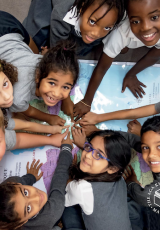Pinto Belo João: A determined teacher and a collaborative planner
“Being a teacher is not easy, because we have to teach and learn every day. I chose a career in teaching because I like to share what I know with others, especially young people, to help them to overcome the challenges in life. Being a teacher is like taking care of something special, so I decided to take care of that special thing, walking together in order to discover the world around us.”
Pinto Belo João is a grade 2 teacher at the Aga Khan Academy in Maputo. Born in Maputo, Mozambique, Pinto attended a teacher training course in Matola in 2007 where he became a primary teacher and then attended Pedagogical University in 2011 to study education. He came to the Academy as part of the Teacher Preparation Programme (TPP), which was established by the Aga Khan Academies to train recent teacher graduates to become International Baccalaureate (IB) teachers.
“Honestly I didn’t know many things about the Academy before I joined, but I always was eager to learn and grow professionally,” says Pinto. Through the Aga Khan Academy, Pinto says he has grown professionally in terms of learning new approaches to teaching and learning, trying new things and giving himself a chance to learn more. “Through professional development, the Academy helped me become a more effective teacher and a collaborative planner,” he says proudly.For Pinto, the most rewarding aspect of the Aga Khan Academy is teaching while surrounded by experts. This environment has given him the opportunity to try new things and granted him time to reflect on teaching strategies. This has been both valuable and powerful for Pinto as it allowed him to share experiences related to classes and receive guidance and support from others. What Pinto really likes about the Academy is the integration of the Aga Khan Curricular Strands. “In my opinion these Strands make us unique and different from others,” he says.
Reflecting on enlightening experiences at the Academy, Pinto narrates a particular day when he was teaching mathematics through games. He says that while he was giving instructions on how to play the game he was surprised to see the students already playing the game before he could even finish explaining. “I learned something that day: we should never underestimate our students. Sometimes we think that we have to teach something, but the students already know it. We need to be careful in our approaches,” Pinto remarks.
In this way, Pinto has learnt profoundly from his students and feels that the teacher-student relationship, reinforced by trust, is of the utmost importance. “We need to establish trust so that the process runs toward success both inside and outside the classroom,” he says.Relationships in the classroom must also involve parents – Pinto knows the importance and necessity of parental involvement in the education of their children. He regularly updates the parents about what they do in class and about their school trips – he also ensures that he shows parents the newsletter with stories of learning from the classroom. Some of the homework Pinto assigns includes parent personal experiences that they can share with their children.
At the Academy, Pinto says they try as much as they can to involve all students in activities and give each of them a role in groups to make them appreciate each other’s abilities. “By promoting activities like social community, [this] makes the students reflect on their own actions,” he remarks. Pinto explains that students come from different backgrounds and nationalities and that this is what makes the residential environment multicultural and promotes pluralism. When the students are exposed to this environment, Pinto says, “They learn more from each other and respect diversity. It is a great experience for them.” Ensuring a climate of pluralism on campus is not an easy task, Pinto says. “But through student’s responsibilities, we can ensure that they are working together.”




